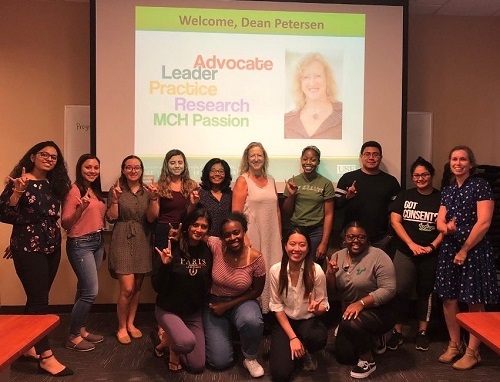A pipeline to public health: COPH program cultivates future maternal & child health professionals
If you explore the field of public health, you’ll notice that many of the statistics used to represent the health of nations involve mothers and children. And for good reason. The health of individuals and families is vital to the health of the larger communities in which they live.
In light of this, the USF College of Public Health (COPH) has instituted a Maternal and Child Health (MCH) Pipeline Training Program, led by program coordinators Drs. Anna Torrens Armstrong and Charlotte Noble. It’s a two-year program aimed at recruiting and training a diverse, culturally competent and passionate group of students to specialize in the maternal and child health field. It focuses on teaching students how to combat health disparities and pervasive maternal and child health issues in Florida and throughout the rest of the world.
The program, which was started at USF in 2016, expanded the continuum of MCH training available at USF that includes graduate, post-doctoral and workforce training. The MCH Pipeline is open to students of all majors and requires participants to take two courses: one focused on maternal and child health and the other focused on health disparities and social determinants of health.
In addition to these courses, MCH Pipeline scholars get the opportunity to shadow or intern with local maternal and child health professionals, participate in summer training sessions that help guide them toward future career paths, and work with graduate students and faculty mentors on research and public health topics of interest.

“[We] think the value of the undergraduate MCH Pipeline Training Program is the ‘inside’ access and competitive edge it gives first-generation students to further training in graduate and professional programs,” said Armstrong and Noble. “Through didactic training, experiential learning and one-on-one mentoring, the program pulls back the curtain on what is often referred to as ‘the hidden curriculum’ of higher education that can create disparities in educational and professional trajectories for minority, first-generation and economically disadvantaged students.”
Casey Morocho, an undergraduate psychology major who recently completed the program, believes the experience gave her a better grasp of the generational issues she hopes to address as a future professional in the field.
“I learned how much the health of our parents affects our health outcomes, which continues to affect future generations,” said Morocho. “Understanding and learning more about different aspects of MCH can help break the cycle of preventable and negative health outcomes, such as type 2 diabetes.”

PhD (far right). Photo courtesy of Dr. Armstrong
Morocho, a first-generation student who is very grateful for the sacrifices her parents and family made for her to attend school, was, in part, attracted to the MCH Pipeline Program because of its focus on families. She also appreciated how it ties in with all aspects of mental and physical health.
Morocho admits that she was somewhat nervous about starting the program since it takes a full two years to complete, but ultimately she found it was well worth her time.
“I was anxious about the length of the program when I first applied, but I soon started wishing it was longer because it became one of the best experiences in my college journey,” said Morocho.
Morocho particularly valued the monthly seminar meetings with program leadership and USF faculty. In these meetings, students and faculty discuss a variety of public health topics, ranging from maternal and child health issues to mental health/illness. The latter discussion is what led Morocho to her desired field of clinical psychology.
“I think [the meetings] were the best part of the program because they made me realize that I had a great interest in public health,” said Morocho. “After a couple of meetings and talks with my mentors, I decided to pick up a minor in public health. I’m really grateful to this program for helping me realize what I want to do in the future.”
Morocho plans to attend graduate school and pursue a doctorate degree in clinical psychology. Afterward, she intends to work as an agent of change for mothers and children in Hispanic communities. “I want to become a clinical psychologist and work with Hispanic women and children who need help with long-term mental illnesses,” said Morocho. “I hope my career will take me abroad to work with programs and organizations that want to address mental health needs.”
Story by Cody Brown, USF College of Public Health
